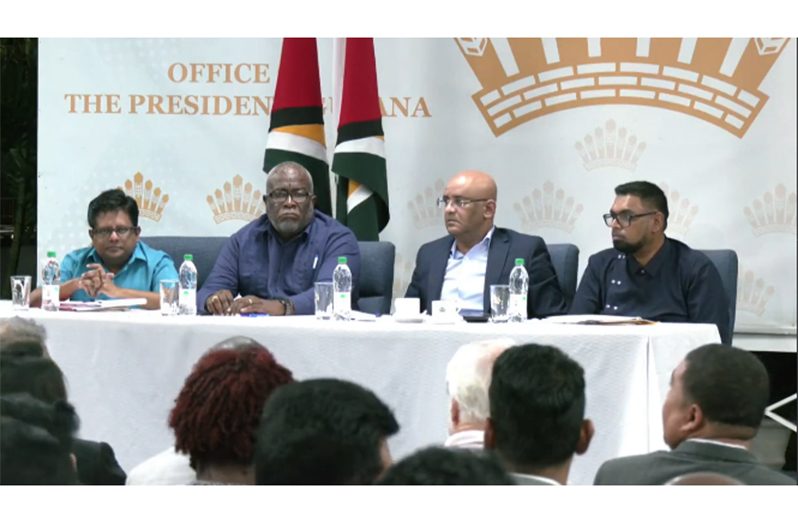–high on Vision 2030 agenda, President Ali says during multi-stakeholder discussion
IN keeping with the government’s aim to build a resilient economy for 2030 and beyond, President, Dr. Irfaan Ali has said that leaders have to build a future that develops Guyana’s competitiveness, increases productivity and creates more employment opportunities, among other things.
The President made those remarks during a discussion for 2023 and beyond, which was held at State House and saw stakeholders from several sectors coming together for a frank discussion on moving the country forward.
The Head of State said his government intends to build a country that has macroeconomic stability, resilience, and sustainability to ensure there is long-term continuous development and growth.
He asked: “How do we in the next eight years, lay the foundation that will build the economy that will perform in a world 2030 and beyond; that will be very much different from what you see today and still be able to compete globally and be a leader in a number of areas?”
It was then that President Ali related that his position is that they can easily articulate a vision and work on a vision to position Guyana as a leader in energy, climate and environmental services and more, but people must understand what is required to achieve all this.
This type of discourse, he added, is necessary and not one that is short-sighted to only look at Budget 2023 and look at the removal of a few taxes and other smaller measures.
The Head of State said it must be a forum to ascertain how relevant stakeholders could build a system that is fit for purpose and brings the ability to be flexible, and build a competitive environment in which the country will operate.
Against this backdrop, he related that there are a number of areas that the future platform of the country will be built on which include energy security, food security, ecological services, technological services, manufacturing and agro-processing.
He added: “Sometimes, we have to remove from the short-sighted nature of ourselves and look at the long term, and that is what we are here to look at. How do we position ourselves to benefit and to be part of this major transformation that will take place as a result of the investment that will take place over the next eight years?”
President Ali went on to note that discussions must surround the ideas and challenges that might be faced along the way and how those challenges could be addressed.
In addition to this, he said those discussions must be frank, open, positive, proactive and forward-looking

TRANSFORMATIONAL AGENDA
The government has already embarked on a massive transformational agenda which includes several projects across the country to position Guyana to further improve its competitiveness.
“It’s not only the big macro issue we’re talking about, we’re looking at the micro issue, improving our competitiveness, our productive capacity, we have to build a future that develops the competitiveness of our country, increases our productivity,” he said.
Guyana’s economy 2030 and beyond, Dr. Ali said, will stand once this transformative agenda is pursued diligently and using the examples of other nations as it relates to what not to do.
Speaking specifically of certain sectors, President Ali told the gathering that they must look at how they can strengthen the banking sector to deploy more capital, among other things.
Meanwhile, one attendee from the private sector raised concerns about an apparent shortage of foreign currency.
In response to this, Vice-President, Dr. Bharrat Jagdeo, said that Guyana does not have a single foreign currency market, where the aggregate supply and aggregate demand are allowed to clear.
What the country has is several banks with their own demand and their own supply to their consumers and as a result, this is why the market does not clear.
Speaking specifically to one banker who raised the issue, the Vice President said that one bank may have a shortage because their demand is greater while another may have a surplus, but will never sell to a customer of another bank or will then charge them at a higher price.
“So, the state has to deal with the aggregates. The problem is that people use these Cambio licenses as a tool for their own competitiveness and to treat their own customers,” he said.
In most financial systems, he added there are interbank markets not just for money, but also for foreign currency, which people can trade; this, however, does not operate in Guyana.
The Vice-President said, therefore, that authorities cannot intervene every time there is a fluctuation in the market, so stakeholders have to work closer to find solutions.
Meanwhile, a number of other stakeholders in various sectors across the private sector made significant contributions and also raised concerns as part of the engaging session.





.jpg)








